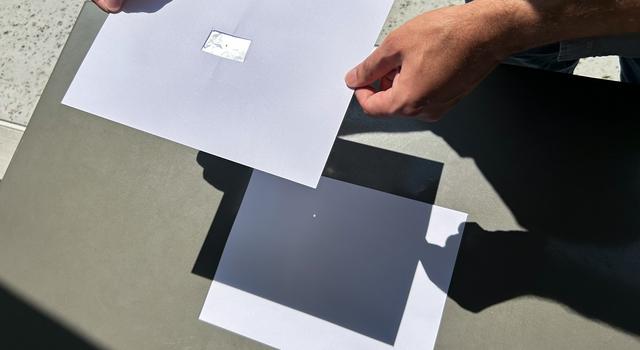The second season of "Surprisingly STEM" kicks off with a new episode featuring NASA space food scientist Xulei Wu. Learn how Xulei trains astronauts for dining in space and what solutions she and the other food scientists have cooked up to meet the challenges of eating in a microgravity environment. Ready to take a bite out of food science? Try this STEM activity!
Click here to read more about Xulei's STEM journey. | | On Monday, April 8, a total solar eclipse will cross North America, passing over Mexico, the United States, and Canada. Join NASA’s Science Mission Directorate, Office of Communications, and Office of STEM Engagement for an informational webinar on Tuesday, Jan. 23, at noon EST, to learn about the solar eclipse and get an update on NASA’s plans for public and student engagement. Participants will learn about the science behind solar eclipses, how to safely view a solar eclipse, and connections to NASA’s study of the Sun. Click here to register to attend.
Visit the links below for even more solar eclipse resources. | | More Ways to Get Involved | | Audience: K-12 and informal educators, parents, and caregivers Mission Dates: Tuesday, Jan. 23 - Monday, Jan. 29
Sally Ride EarthKAM is a free STEM educational program managed by the U.S. Space & Rocket Center in Huntsville, Alabama. EarthKAM allows students in grades K-12 to take images of Earth from space using a camera aboard the International Space Station.
Use EarthKAM as a teaching tool to study subjects ranging from geography to art to meteorology.
| | Audience: Educators (formal, informal, home-school) of students ages 11-18 Registration Deadline: Monday, Feb. 19 NASA’s Wallops Flight Facility and iEDU invite educators to register for the free Cubes in Space program. Participants receive a course of activities that guide students to design experiments or technologies that connect to a real-world Earth or space-based problem or need. Selected experiments will be launched via a sounding rocket from Wallops Flight Facility in Virginia as part of RockSat-C in late June 2024, or from a high-altitude scientific balloon in New Mexico by NASA’s Balloon Program Office in late August 2024. | | Audience: Individuals, teams, and U.S. organizations (must be U.S. citizens or permanent residents, ages 18 and above) Information Session: Registration Deadline: Thursday, Feb. 8 NASA’s Space Technology Mission Directorate is seeking to expand the agency’s network of proposers and foster effective approaches and methods to successfully engage underrepresented and diverse space technology innovators, researchers, technologists, and entrepreneurs. The Space Tech Catalyst Prize will award $25,000 to selected individuals and teams engaging underrepresented audiences. Winners will be invited to an in-person event at NASA’s Goddard Space Flight Center in Greenbelt, Maryland, and will influence NASA practices for engaging the next generation of STEM students.
| | Audience: Educators, college and university faculty, informal education professionals Event Date: Feb. 27-29 Join the NASA Transformative Aeronautics Concepts Program for “imaginAviation 2024,” a virtual event that will let participants experience the latest innovations in NASA aviation research. Click here to register your watch party event. | | Virtual Learning Opportunities | | Audience: Educators and students in middle school and high school Event Date: Monday, Jan. 29 - Friday, Feb. 2 Learn about heliophysics science and STEM careers with the Space Weather Explorers Week website. Find cool facts, games, and an online, interactive discussion board where your class or group can submit questions to leading space scientists. The website also features educational activities formatted into a week-long course designed to complement live event weeks that take place several times per year. During these events, students are able to interact with volunteer scientists, often from under-represented groups in science. The website and program emphasize the importance of role models in science. The next live week features the theme “The Sun touches everything – even fashion” and begins on Monday, Jan. 29. | | Audience: Formal and informal K-12 educators and students Registration Deadline: Thursday, Feb. 15 Event Date: Thursday, Feb. 22 NASA's Stennis Space Center in Bay St. Louis, Mississippi, is hosting an Explore Stennis Briefing for Students and registration is open for virtual participation. This unique learning opportunity will immerse students in NASA’s work and provide a chance to directly connect with the space agency.
During this live broadcast, a panel of NASA experts will discuss how the agency uses computer science to achieve its mission goals. They will also respond to questions submitted by students. | | Opportunities With Our Partners | | Event Date: Wednesday, Jan. 24 | | Registration Deadline: Friday, Feb. 16 | | |
Are you looking for NASA STEM materials to support your curriculum?
Find NASA science resources for your classroom. The NASA Science Activation (SciAct) program connects diverse learners of all ages with science in ways that activate minds and promote a deeper understanding of our world and beyond. https://science.nasa.gov/learn
Check out the ‘Explore NASA Science’ website! Science starts with questions, leading to discoveries. Visit science.nasa.gov. To view the site in Spanish, visit ciencia.nasa.gov. | | Visit NASA STEM Engagement on the Web: | | | | | | |


















